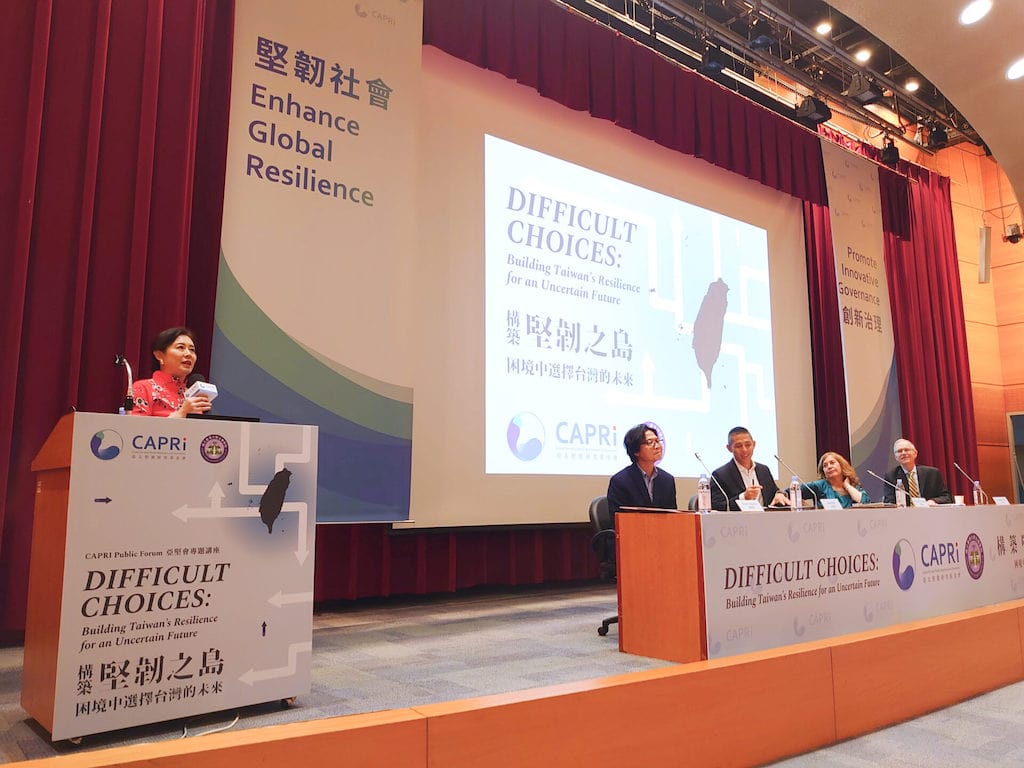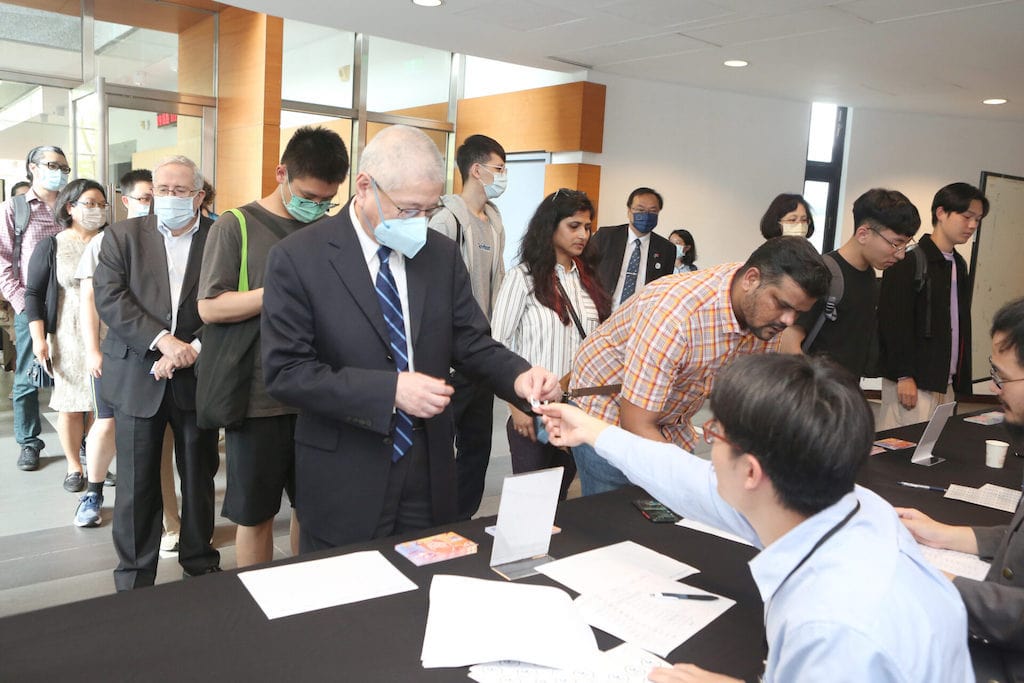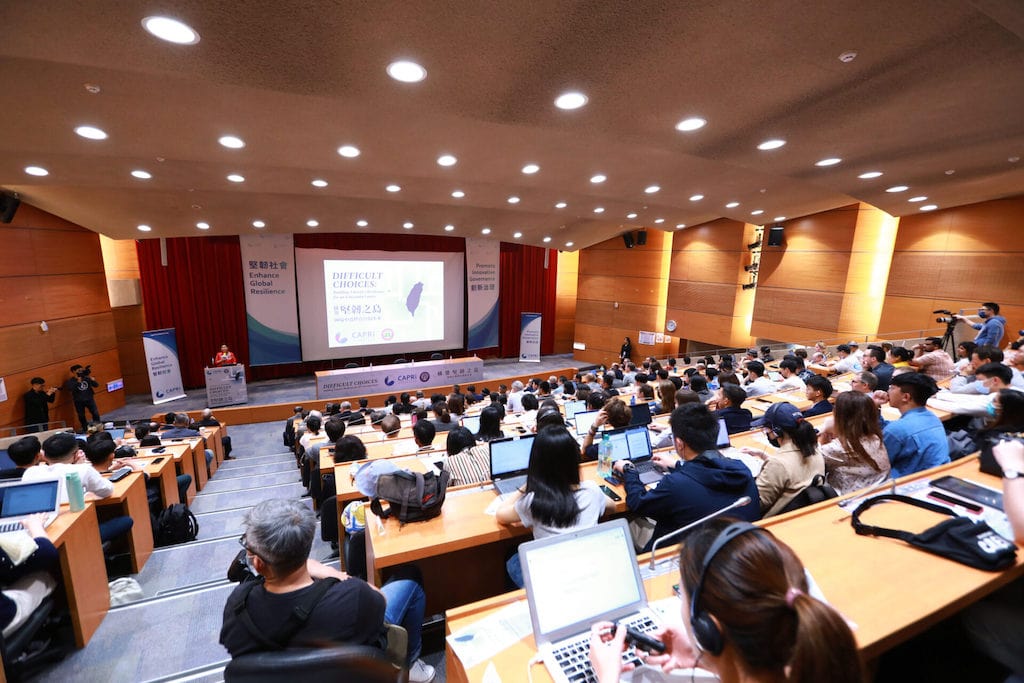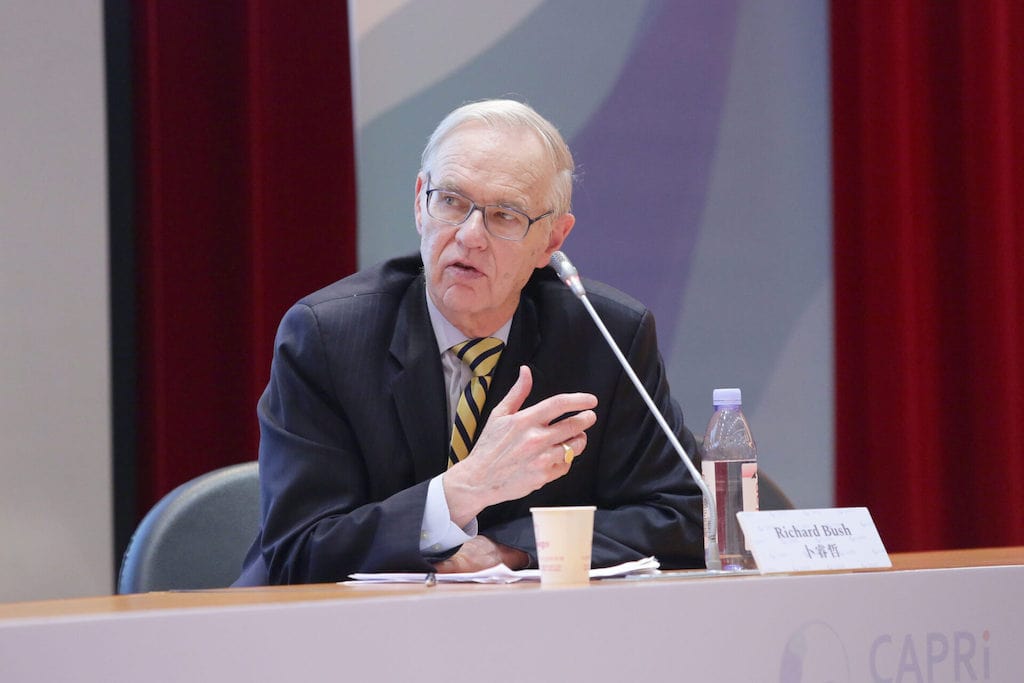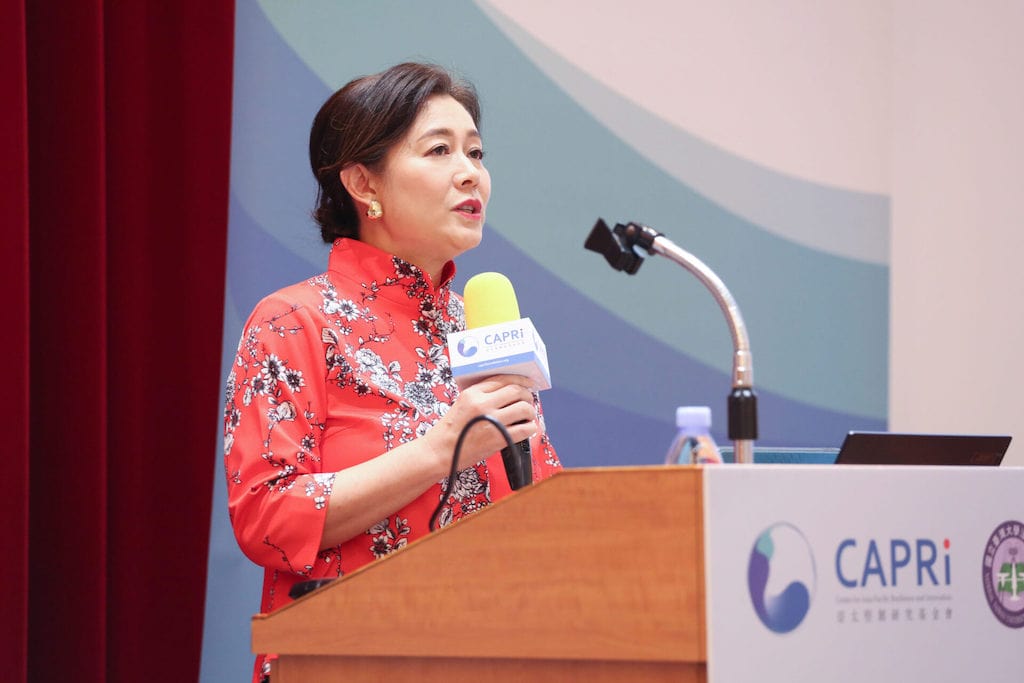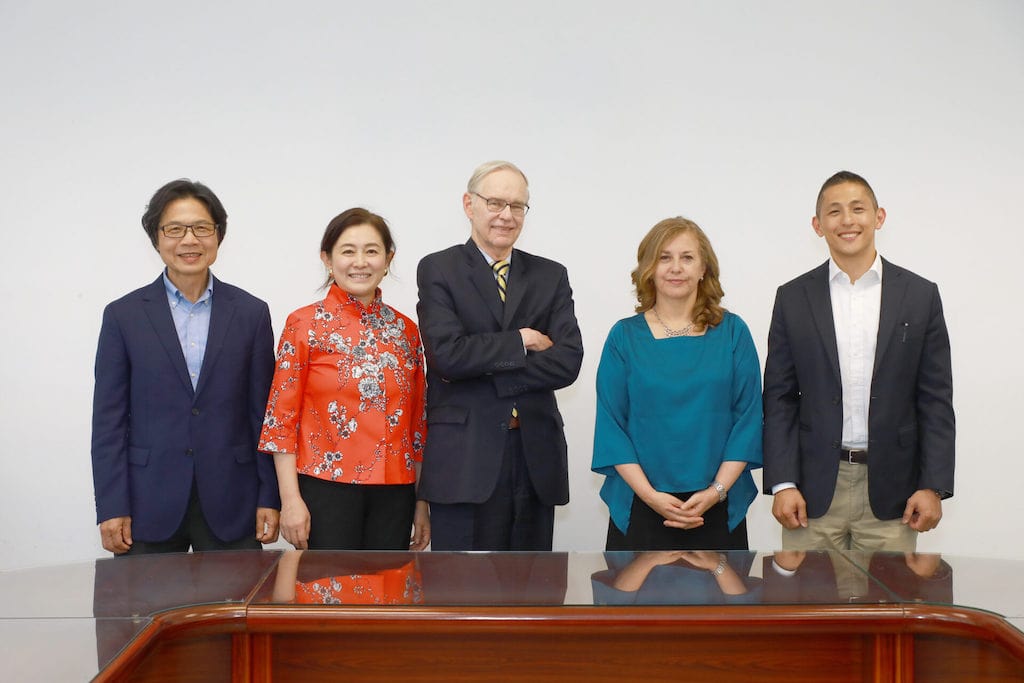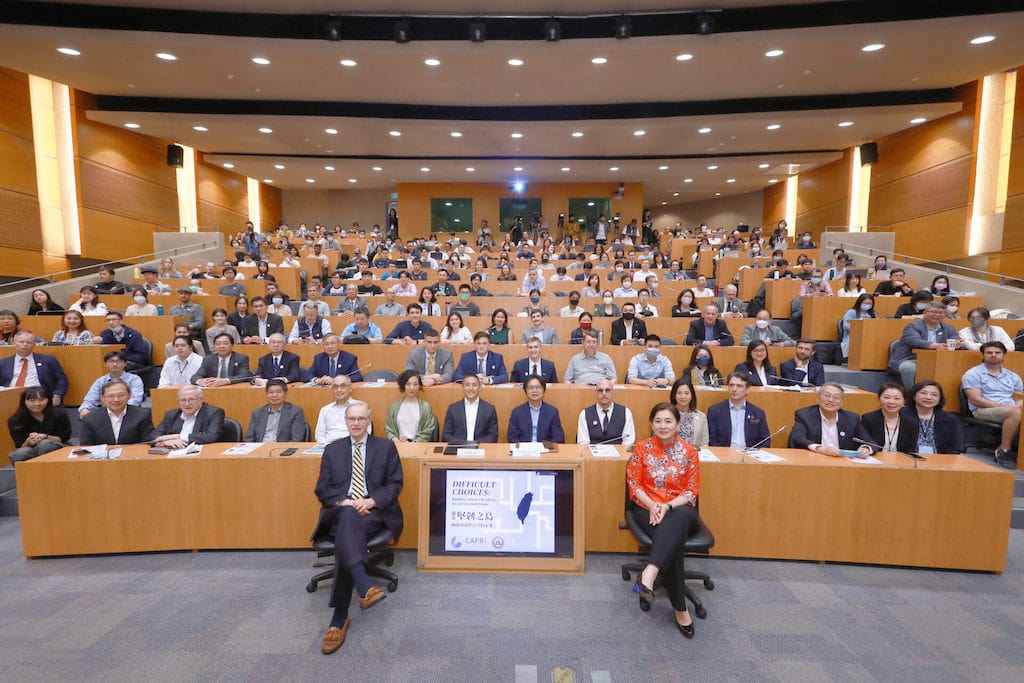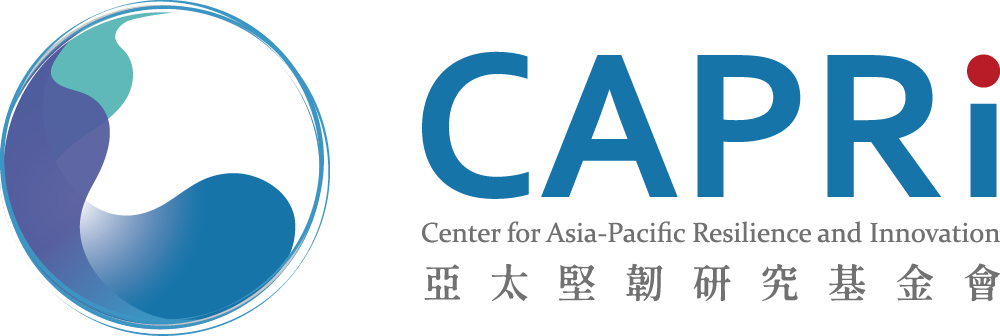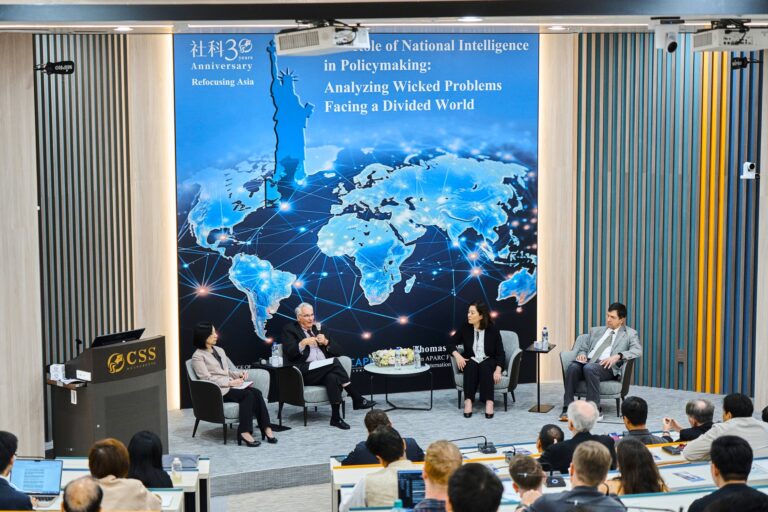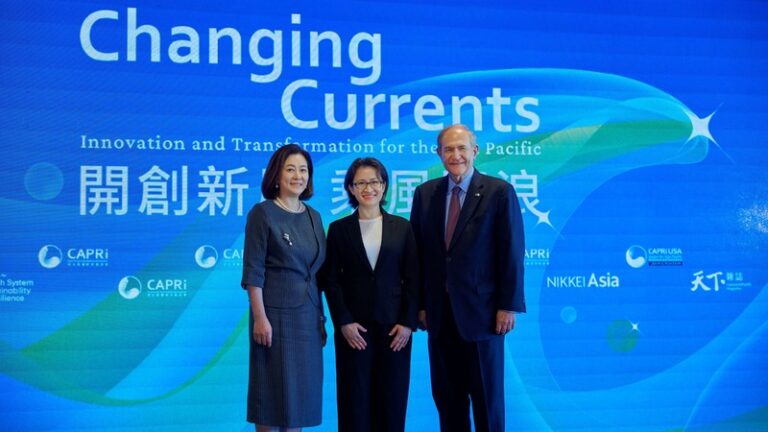[trp_language language=”en_US”]
TAIPEI, TAIWAN March 22, 2023—Taiwan has to build consensus to democratically make tough decisions about its future, said Dr. Richard Bush, nonresident senior fellow at Brookings Institution, in a public forum hosted by the Center for Asia-Pacific Resilience and Innovation (CAPRI) and the National Taiwan University College of Law on Wednesday.
Bush, a former Chairman of the American Institute in Taiwan, praised Taiwan’s democracy but noted that much improvement is still needed, saying that “Taiwan’s democratic process is more impressive than the government’s performance.” Nevertheless, “Even if the American system may be failing, I can still hope that Taiwan will succeed,” said Bush to students from National Taiwan University, National Chengchi University, and others who attended the event.
The forum drew ideas from Bush’s recent book Difficult Choices: Taiwan’s Quest for Security and the Good Life and incited conversation on the challenges Taiwan faces in government budget, public health, energy security, and military defense. Bush commented that the Taiwanese democratic government has the arduous task of reconciling competing priorities, needing to decide between economic growth and social equity, domestic priorities and defense, and lower and higher taxes.
Desiring to engage with audience and especially the students, Bush invited the audience to participate in a poll on Taiwan’s performance in democratic governance and public policy. The results showed that 79% of respondents were confident or somewhat confident in Taiwan’s future, and 82% agreed that compared with other forms of government, a democratic government can best address the challenges Taiwan faces; however, over one-fourth of those that agreed to the statement believed that Taiwan’s government, despite being democratic, is ill-equipped to do so. Many participants agreed that Taiwan’s political parties do not divide the Taiwanese people but rather reflect the division already between them.
Afterward, expert panelists Alicia García Herrero, Chief Economist for Asia Pacific at Natixis; Enoch Wu, director of Forward Alliance; and Jiunn-rong Yeh, chair professor at National Taiwan University College of Law, highlighted that Taiwan’s economic development, national security, and democratic governance have a great influence on not only the Asia Pacific but also the world.
“There may come a day when the people of Taiwan must make a fundamental choice about their long-term future,” Bush said. “It is vitally important that this choice be made democratically, […] and it must be a smart choice, crafted by this society’s best minds and based on the best interests of the population at large.”
[/trp_language]
[trp_language language=”zh_TW”]
今日(3月22日)亞太堅韌研究基金會(簡稱「亞堅會」)與台灣大學法律學院共同舉辦專題講座,邀請布魯金斯研究院非常駐資深研究員卜睿哲(Richard Bush),於下午2時假國立臺灣大學法律學院霖澤館就「構築堅韌之島:困境中選擇台灣的未來」(Difficult Choices: Building Taiwan’s Resilience for an Uncertain Future)題目發表專題演講。專題演講後由亞堅會董事、歐洲智庫 Bruegel 高級研究員、法國外貿銀行亞太區首席經濟學家艾西亞(Alicia Garcia Herrero),壯闊台灣聯盟理事長吳怡農,以及國立臺灣大學講座教授、前內政部部長與教育部部長葉俊榮三位學者專家作為與談人,與現場台灣青年學子以跨世代角度共同思考台灣如何多方政策考量,釐清議題優先次序,以開展台灣良善治理、邁向堅韌未來。
本講座由亞太堅韌研究基金會董事長林夏如教授與國立臺灣大學法律學院葉俊榮講座教授進行開場致詞,卜睿哲在演講中與現場來自國立臺灣大學、國立政治大學等百餘位青年學子圍繞政府預算、公共衛生、能源安全以及徵兵制度四大政策議題互動。他表示,台灣政治領袖與各界菁英應凝聚共識,平衡社會對多重議題的利益需求與政策考量,為台灣的未來作出民主且明智的抉擇。為了台灣長遠的未來和民眾的最佳利益,「台灣的政治領袖應該齊聚一堂,運用他們的創造力,做出艱難的抉擇。」卜睿哲是華府資深外交官與台灣研究專家,在美國政府服務十九年,曾擔任美國在台協會理事主席,深入參與台美事務。本次演講主題呼應他的新著Difficult Choices: Taiwan’s Quest for Security and the Good Life,其中譯本《艱難的抉擇:台灣對安全與美好生活的追求》於2022年在台灣出版。
卜睿哲指出,國際社會對台灣的民主政治體制贊譽有加,但台灣民主治理的績效仍有改進空間,「台灣的民主進程比政府的執政表現更有看點。」要在經濟成長與社會公平之間、不同世代需求之間、内政事項與國防目標之間取得平衡,對政府來説並不容易。在卜睿哲看來,釐清議題優先順序和協調資源分配都需要高明的政治智慧和靈活的民主決策機制。當台灣面臨日益嚴峻的外部安全威脅時,更加需要以良善和創新的治理凝聚共識,提升人民對民主制度的信心,在困境中選擇台灣堅韌的未來。
為了促進跨世代交流,卜睿哲設計一份涵蓋前述四大政策議題的調查問卷,在演講現場邀請聽衆填答並即時揭曉調查結果,卜睿哲亦對現場調查結果做出簡評。當問及政府在推動經濟成長和促進社會公平兩方面的表現,40%的與會者認為政府在推動經濟成長方面做的比促進社會公平還要好。對於政府在CPVOD-19期間的表現,只有45%的與會者認同政府表現非常好。就稅收問題,43%的與會者認為只有大企業才應該繳更多稅款以滿足社會福利需求。高達78%的與會者表示願意為減少污染和溫室氣體的排放支付更多的電費。針對國防議題,亦有八成與會者表示台灣的兵役制度應達一年或以上。
卜睿哲的問卷亦包括對台灣民主治理前景的展望。當與會者被問到「你對台灣的未來有信心嗎?」79%回答非常有信心或一定程度上有信心。60%的與會者認為,和其他形式的政府相比,一個民主的政府更能因應台灣面臨的挑戰;65%的與會者認為,台灣政府整體而言在促進法治和社會公義方面做得很好。不過,當被問及台灣社會分裂與極化現象時,45%的與會者認為台灣社會本來就是分裂的,政黨沒有製造社會分裂,是在反映這種社會分裂。對此,卜睿哲表示,台灣政府和政黨在凝聚社會共識上還有一段長路。
專題演講後舉行專家座談,由亞堅會董事、歐洲智庫 Bruegel 高級研究員、法國外貿銀行亞太區首席經濟學家艾西亞(Alicia Garcia Herrero),壯闊台灣聯盟理事長吳怡農,以及國立臺灣大學講座教授、前内政部部長與教育部部長葉俊榮三位專家作為與談人,針對台灣的經濟發展、國防建設和民主法治等議題做出進一步剖析和討論。卜睿哲亦對三位專家的觀點作出回應。
亞堅會董事長林夏如教授在總結發言中感謝卜睿哲受邀來訪台灣,並指出,台灣所面對的艱難抉擇是當下亞太乃至全球民主社會治理挑戰的縮影。為複雜的公共治理議題尋找切實的政策解方,正是亞堅會工作的使命所在。今日活動由亞堅會與國立臺灣大學法律學院共同舉辦,活動全程錄影以及卜睿哲的演講全文皆可於亞堅會網站觀看。
[/trp_language]
